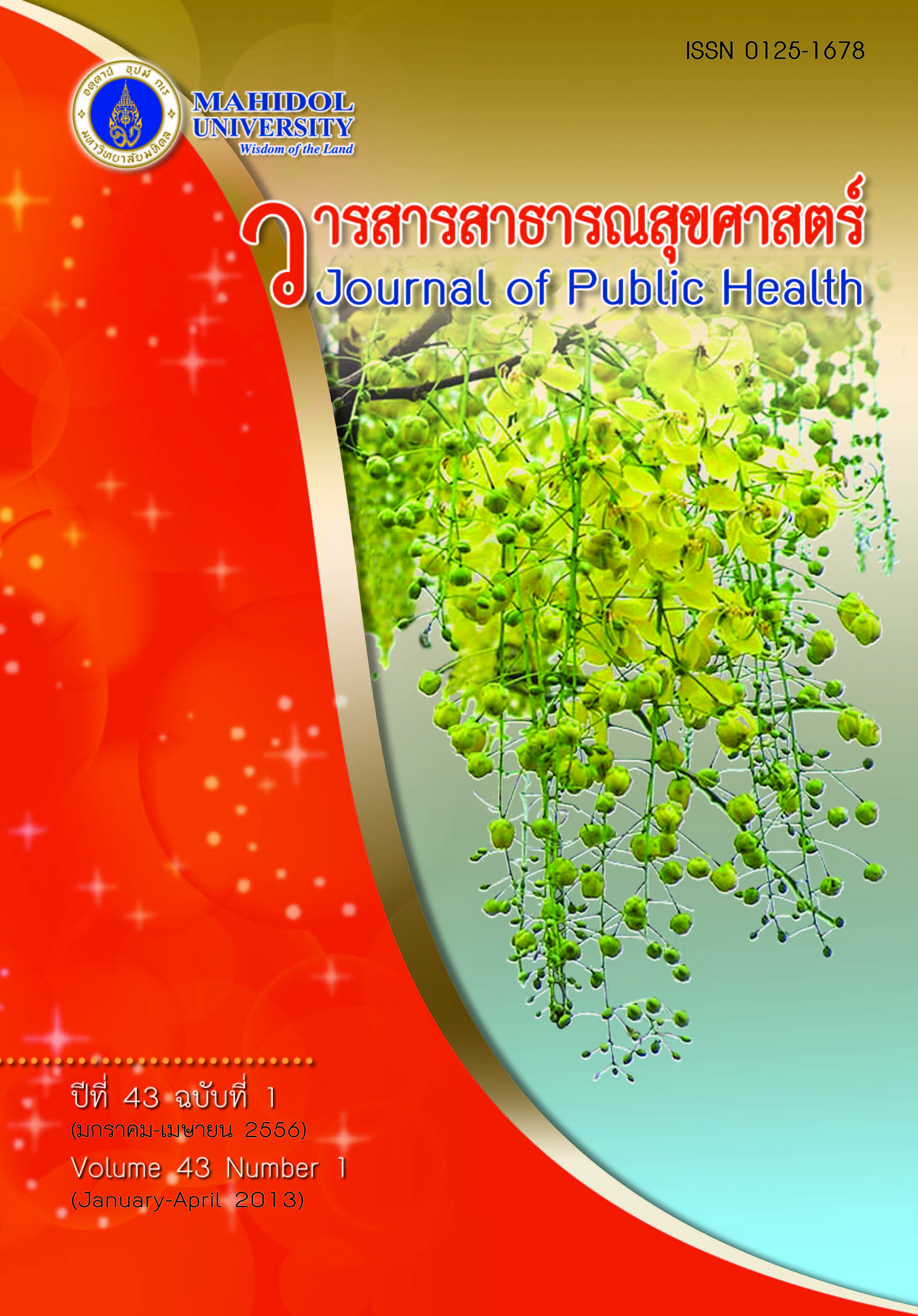ประสิทธิผลของโปรแกรมทักษะชีวิตในการป้องกันพฤติกรรมเสี่ยงที่นำไปสู่ การมีเพศสัมพันธ์ของนักเรียนชั้นมัธยมศึกษาตอนต้นจังหวัดนครปฐม
Keywords:
ทักษะชีวิต, พฤติกรรมป้องกันความเสี่ยงที่นำไปสู่การมีเพศสัมพันธ์, นักเรียนชั้นมัธยมศึกษาตอนต้น, life skills, preventive sexual risk behaviors, secondary school students (grade 8)Abstract
บทคัดย่อ
การวิจัยกึ่งทดลองแบบสองกลุ่มวัดก่อนและหลังการทดลองนี้ มีจุดมุ่งหมายเพื่อศึกษาประสิทธิผลของโปรแกรมทักษะชีวิตในการป้องกันพฤติกรรมเสี่ยงที่นำไปสู่การมีเพศสัมพันธ์ ของนักเรียนชั้นมัธยมศึกษาตอนต้น จังหวัดนครปฐม กลุ่มตัวอย่างเป็นนักเรียนชั้นมัธยมศึกษาปีที่2 โดยกลุ่มทดลองจากโรงเรียนในตำบลห้วยพลู และกลุ่มเปรียบเทียบจากโรงเรียนในตำบลศรีมหาโพธิ์ กลุ่มละ 30 คน กลุ่มทดลองได้รับโปรแกรมทักษะชีวิตในการป้องกันพฤติกรรมเสี่ยงที่นำไปสู่การมีเพศสัมพันธ์ของนักเรียน ซึ่งประยุกต์ใช้แนวคิดทักษะชีวิตและการเรียนรู้แบบมีส่วนร่วม การจัดกิจกรรม ประกอบด้วย การบรรยาย การอภิปรายกลุ่ม การระดมสมอง การแสดงบทบาทสมมติ เกม การฝึกทักษะชีวิต สัปดาห์ละ 1 ครั้ง จำนวน 6 ครั้งๆละ 60 นาที ส่วนกลุ่มเปรียบเทียบได้รับการสอนวิชาสุขศึกษาตามปกติของโรงเรียน เก็บรวบรวมข้อมูล โดยใช้แบบสอบถาม วิเคราะห์ข้อมูลด้วยสถิติ จำนวน ร้อยละ ค่าเฉลี่ยเลขคณิต ส่วนเบี่ยงเบนมาตรฐาน Paired Samples t- test และ Independent Samples t- test ผลการศึกษาพบว่า หลังการทดลอง กลุ่มทดลองมีความตระหนักในตนเอง ความภาคภูมิใจในตนเอง ทักษะการตัดสินใจและแก้ไขปัญหา ทักษะการสื่อสาร และพฤติกรรมป้องกันความเสี่ยงที่นำไปสู่การมีเพศสัมพันธ์เพิ่มขึ้นกว่าก่อนการทดลองและเพิ่มขึ้นสูงกว่ากลุ่มเปรียบเทียบอย่างมีนัยสำคัญทางสถิติ (p < 0.05) ผลการศึกษาแสดงให้เห็นว่าการประยุกต์โปรแกรมทักษะชีวิตในการป้องกันพฤติกรรมเสี่ยงที่นำไปสู่การมีเพศสัมพันธ์ของนักเรียนชั้นมัธยมศึกษาตอนต้นมีประสิทธิภาพ ดังนั้นควรมีการนำโปรแกรมนี้ไปใช้กับนักเรียนที่มีระดับการศึกษาใกล้เคียงกันต่อไป
Effectiveness of Life Skills Program for Preventive Sexual Risk Behaviors of Secondary School Students, Nakhon PathomProvince
ABSTRACT
This quasi-experimental research with 2 Groups and a Pretest-Posttest design was aimed at investigating the effectiveness of a life skills program for preventing sexual risk behaviors of junior secondary school students in Nakhon Pathom Province. The sample was of secondary school (Grade 8) students. The experimental group was composed of 30 students in the Srimahapoe Subdistrict and 30 students in a comparison group from the same school. The experimental group participated in the life skills program for preventing sexual risk behaviors, applying the concepts of life skills development and participatory learning. The educational activities organized were lecture, group discussion, brainstorming, role-playing, simulation games, and 6 life skills training sessions, once a week and 60 minutes for each session. The comparison group participated in the normal health education sessions of the school. Data collection was done by using a questionnaire and the data were analyzed by using the following statistics: frequency, percentage, arithmetic mean, standard deviation, Paired samples t-test and Independent samples t-test. The research results showed that after the experimentation the experimental group had gained significantly higher levels of self-awareness, self-esteem, decision-making and problem-solving skills, communication skills, and behaviors preventative to sexual risk than before the program and measured against the comparison group (p<0.05). This finding reflected that the life skills program for developing preventive sexual risk behaviors among secondary school students was effective. Thus, this type of this program should be used with other groups of secondary school students.
Downloads
Issue
Section
License
Creative Commons License CC-BY-ND


